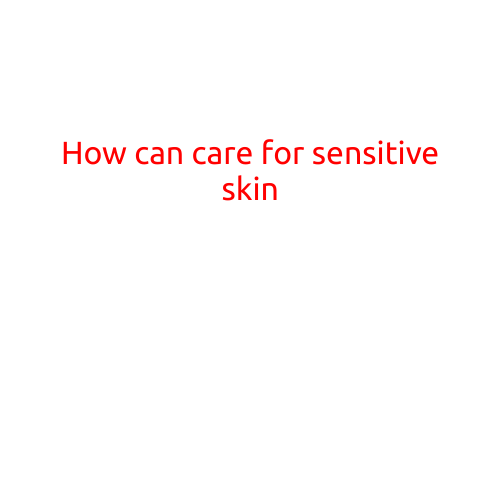
How to Care for Sensitive Skin: Tips and Tricks for a Healthy and Glowing Complexion
Do you have sensitive skin? If so, you’re not alone. Sensitive skin is a common condition that affects millions of people worldwide. Characterized by redness, itching, burning, and inflammation, sensitive skin can be frustrating to deal with, especially when it comes to finding skincare products that don’t irritate it.
The good news is that caring for sensitive skin is easier than you think. By following some simple tips and tricks, you can keep your skin healthy, balanced, and looking its best. In this article, we’ll explore the best ways to care for sensitive skin, from avoiding harsh products to introducing calming ingredients and protective measures.
Understand Your Skin
Before we dive into the tips, it’s essential to understand what sensitive skin is. Sensitive skin is a skin type that reacts easily to environmental factors, products, and even temperature changes. It’s often characterized by:
- Redness
- Itching or stinging
- Burning or warm sensations
- Inflammation
- Erythema (flushing)
To care for sensitive skin, it’s crucial to identify your triggers and trigger points. Keep a skincare diary to track your reactions to different products, and avoiding common irritants like:
- Fragrances
- Dyes
- Parabens
- Glycolic acid
- Salicylic acid
Cleanse Gently
Cleansing is the first step in any skincare routine, and it’s especially important for sensitive skin. Use a gentle, fragrance-free cleanser that’s specifically formulated for sensitive skin. Avoid using hot water, as it can strip the skin of its natural oils. Instead, use lukewarm water and pat your skin dry gently.
Exfoliate Wisely
Exfoliating sensitive skin can be a challenge, but it’s essential for removing dead skin cells and revealing a brighter, more even-toned complexion. Use a chemical exfoliant containing alpha-hydroxy acids (AHAs) or beta-hydroxy acids (BHAs), which are gentler than physical exfoliants. Start with a low concentration and gradually increase as your skin becomes more tolerant.
Moisturize Balance
Moisturizing is crucial for sensitive skin, as it helps to lock in moisture and soothe irritation. Look for a moisturizer that’s labeled “hypoallergenic” or “fragrance-free” and contains soothing ingredients like aloe vera, chamomile, or green tea. Apply moisturizer immediately after cleansing and toning while your skin is still damp.
Protect and Prevent
Protection is key when it comes to sensitive skin. Use a broad-spectrum sunscreen with an SPF of at least 30 daily, even on cloudy days. Apply sunscreen 15-30 minutes before going outside, and reapply every two hours or immediately after swimming or sweating.
Additional Tips
- Remove makeup gently using a micellar water or a gentle makeup remover.
- Avoid rubbing or scrubbing your skin, as this can cause irritation and further exacerbate sensitive skin.
- Use a gentle, fragrance-free toner to help balance your skin’s pH.
- Consider using a humidifier to add moisture to dry air, which can help to reduce irritation.
Conclusion
Sensitive skin may present some challenges, but by following these simple tips and tricks, you can keep your skin healthy, balanced, and looking its best. Remember to:
- Cleanse gently
- Exfoliate wisely
- Moisturize balance
- Protect and prevent
By incorporating these habits into your daily skincare routine, you’ll be well on your way to achieving a happy, healthy, and glowing complexion.





